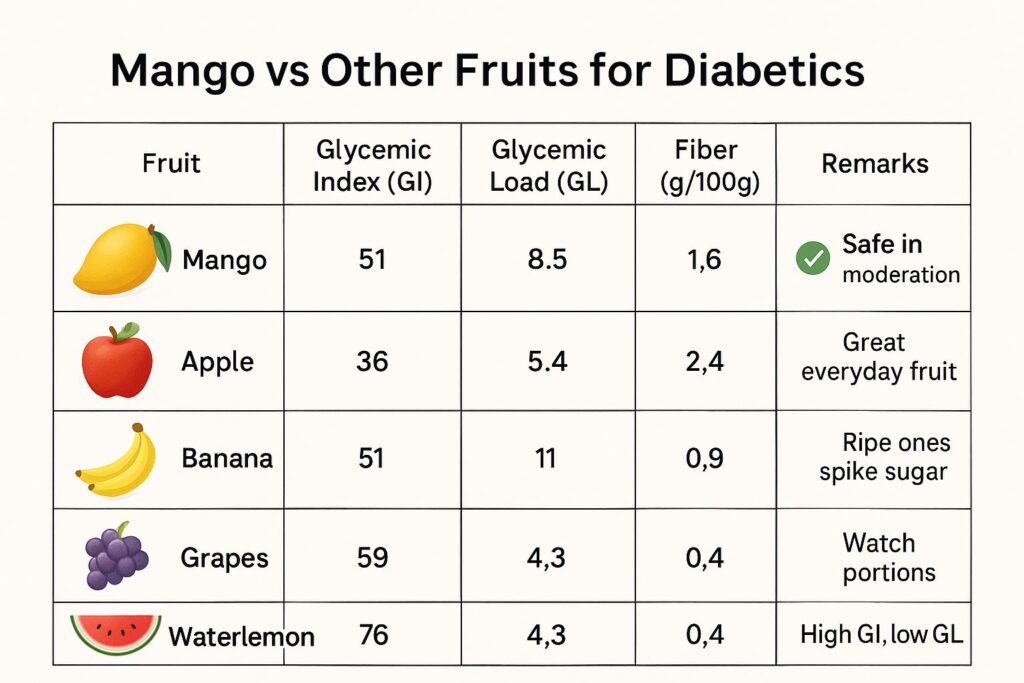Introduction: Sweet Fruit, Sweet Dilemma
Mangoes are often called the “king of fruits”—rich, juicy, and bursting with flavor. But for people living with diabetes, the natural sweetness of mango can feel like a forbidden fruit.
Can diabetics eat mangoes safely, or should they steer clear?
As a licensed pharmacist with a deep understanding of diabetes nutrition, I’m here to provide an evidence-based answer to this very common (and tasty) question.
Nutritional Profile of Mango
Let’s start by understanding what’s in a mango.
| Nutrient (per 100g) | Amount |
| Calories | ~60kcal |
| Carbohydrates | ~15g |
| Sugar | ~13.7g |
| Fiber | ~1.6g |
| Vitamin C | ~36.4mg |
| Vitamin A | ~54ug |
| Glycemic Index (GI) | 51-56 (Low-Medium) |
| Glycemic Load (GL) | ~8.5 per 100g (Low) |
Key takeaways:
• Mangoes are not excessively high in sugar.
• They contain fiber, antioxidants, and vitamins that support immune and eye health.
• The glycemic load is what matters most—portion size is key.
Glycemic Index vs Glycemic Load: What Matters More?
• Glycemic Index (GI) measures how quickly a food raises blood sugar. Mango has a GI between 51 and 56 (moderate).
• Glycemic Load (GL) considers both GI and portion size. GL under 10 is considered low.
A small mango slice (about 100g) has a low glycemic load and is unlikely to cause a rapid spike if eaten properly.
So, Can Diabetics Eat Mangoes?
Yes, diabetics can eat mangoes—in moderation and with mindful pairing.
Mangoes are not inherently “bad” for people with diabetes. What matters is:
• The portion size
• Timing of consumption
• What you pair mango with
• Your current blood sugar control and medications
How to Eat Mangoes Safely with Diabetes
Control Portion Size
Stick to ½ cup to ¾ cup (about 80–100g) at a time. That’s roughly 2–3 mango slices.
Pair with Protein or Healthy Fat
Combining mango with:
• A handful of nuts (almonds, walnuts)
• A spoonful of Greek yogurt
• A boiled egg
…can help slow glucose absorption.
Eat Mango as a Snack—Not Dessert After Meals
Having it on an empty stomach or between meals helps manage blood sugar better.
Avoid Juices or Mango-Based Desserts
These have:
• No fiber
• Higher sugar concentration
• Higher glycemic impact
Monitor Blood Sugar Response
If you have a CGM or glucometer, test your blood sugar before and 1–2 hours after eating mango to observe your body’s reaction.
When Should Diabetics Avoid Mango?
Avoid mango or consult your doctor if:
• Your HbA1c is consistently above 8%
• You are experiencing uncontrolled post-meal spikes
• You have gastroparesis, which slows digestion
• You’re on insulin or sulfonylureas and risk hypoglycemia due to timing mismatch
Pharmacist’s Expert Tip
“As a pharmacist, I recommend that diabetic patients treat mango like a carbohydrate source, not a free fruit. Plan it like you would with rice or chapati—track it, balance it, and enjoy it mindfully.”
Healthy Mango Snack Ideas for Diabetics
| Snack Idea | Benefits |
| Mango + Greek yogurt (unsweetened) | Adds protein, improves satiety |
| Mango + Cottage cheese | Low GI combo with healthy fat & calcium |
| Mango + Chia seeds | Fiber-rich, slows sugar absorption |
| Mango smoothie (with no added sugar) | Blend with cucumber or spinach |

FAQs: Mango and Diabetes
Can mango raise blood sugar quickly?
If eaten in large portions or as juice, yes. But small, fresh mango servings have a moderate effect.
Is raw mango better than ripe mango?
Raw mango (kaccha aam) has less sugar and more fiber, making it safer in larger quantities.
Can I eat mango every day?
You can, if:
• Your sugar is controlled
• You keep portions in check
• You balance your total carb intake for the day
Medical Disclaimer
This article is for informational purposes only and does not substitute professional medical advice. Always consult your doctor, diabetes educator, or pharmacist for personalized dietary guidance.
Final Thoughts
Diabetes doesn’t mean you have to give up on mangoes. With portion control, mindful pairing, and understanding your body’s response, you can savor mangoes safely and joyfully—even with diabetes.
So yes, enjoy that slice—but make it smart!
Want More Diabetes-Friendly Food Advice?
Visit PharmaHeals.com for pharmacist-recommended tips on living well with diabetes—naturally and safely.



